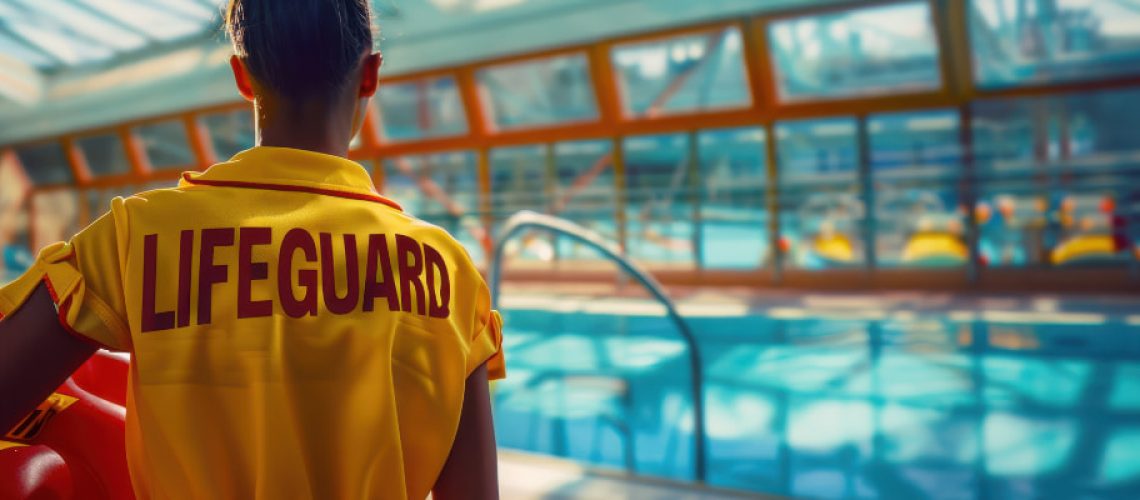Date Published: Oct 5th, 2025
When most people picture a lifeguard, they imagine a chair by the pool, a whistle around the neck, and the watchful eye of someone scanning calm blue water. But lifeguarding is not a one-size-fits-all role. The work of a pool lifeguard compared to a beach lifeguard differs greatly. Both are rooted in the same mission of protecting lives, but the settings, challenges, and skillsets vary. The contrast is worth understanding, especially for anyone looking to move from the pool deck to the shoreline.
The Environment Tells the Story
A swimming pool is a controlled space. The water is filtered, the depth is known, and the boundaries are set by tiles and walls. Pool lifeguards deal with a predictable environment, and while emergencies can occur at any moment, the conditions rarely change unexpectedly.
By contrast, the beach is alive and ever-changing. Waves shift in size and power throughout the day, tides come and go, and hidden currents run beneath the surface. Wind, heat, and visibility all impact how a lifeguard does their job. A flat shoreline in the morning can turn into a rough surf zone by the afternoon. Unlike a pool, the beach doesn’t offer clear lines of sight; swimmers can blend into waves or get carried beyond marker buoys in seconds. Environmental unpredictability is the most defining difference between the two settings.
Hazards Pool Lifeguards Don’t See
In a pool, hazards are mostly related to human behavior: running on wet decks, horseplay in shallow areas, or fatigue during lap swimming. The risks are serious, but they are familiar and easy to monitor.
At the beach, lifeguards face dangers that are invisible to the casual swimmer. Rip currents remain the number one hazard, pulling even strong swimmers offshore with surprising force. Uneven sea beds can cause slips or sudden drops in depth. Marine life—from jellyfish to stingrays—can pose threats, and in some regions, sharks must be considered. Weather is another factor. A sunny day can give way to sudden storms, bringing lightning that forces an immediate evacuation. Beach lifeguards are trained to read these natural hazards and act before conditions spiral into an emergency.
The Skills of A Beach Lifeguard
Pool lifeguards master surveillance techniques, rescue methods, and CPR. These are foundational skills, but beach lifeguards add layers on top. Their training often includes:
- Reading the ocean: spotting rip currents, wave patterns, and safe zones from shore.
- Endurance swimming: being able to cover long distances in rough surf without hesitation.
- Board rescues: using rescue boards to reach struggling swimmers faster than swimming alone.
- Knowledge of marine life: treating stings, bites, and other injuries unique to the ocean.
- First response in remote areas: beaches are not always close to advanced medical help, so lifeguards often provide extended first aid until paramedics arrive.
The sheer physical demand is higher at the beach. Running across sand, diving through waves, and pulling someone out of strong surf takes stamina and technique. Pool rescues require speed and precision, but beach rescues demand both of those plus endurance and adaptability.
Communication and Crowd Management
In both roles, communication is central. Whistles, hand signals, and radios are tools of the trade. But beach lifeguards deal with much larger, more dispersed crowds. A pool deck might host a few dozen swimmers, while a public beach can see hundreds or thousands spread out along the shore.
At the pool, rules are straightforward and enforced in a confined space. On the beach, rules vary depending on weather, water quality, and seasonal activity. Lifeguards often act as educators, explaining rip currents, safe swimming zones, and warning flags to people who may have little ocean experience. It is not just about reacting to emergencies, but preventing them by keeping visitors informed.
Teamwork in Action
Pool lifeguards usually work in smaller teams or even solo at times, depending on the facility. At beaches, lifeguarding is highly team-oriented. Rescues often require multiple lifeguards coordinating with boards, jet skis, or patrol vehicles. Surveillance is split into zones, with lifeguards backing each other up to cover wide areas. The beach lifeguard is rarely working alone, and constant communication keeps everyone aligned.
A Different Kind of Pressure
The responsibility of a lifeguard always carries weight, but the pressure at the beach feels heavier. The scale of the environment, the number of people, and the unpredictability of the ocean demand constant alertness. Beach lifeguards cannot afford lapses in attention because conditions can shift in minutes. That pressure builds resilience and sharp judgment, but it also means the role requires strong mental focus in addition to physical readiness.
The Shared Core
Despite the differences, pool and beach lifeguards are bound by the same mission: to protect and preserve life. They are trained to stay calm under pressure, act decisively, and provide care with confidence. Many beach lifeguards began their careers at pools, building their base skills before taking them to more challenging environments. Both roles deserve recognition and respect, as both stand between swimmers and tragedy.
Final Thoughts
Pool lifeguarding and beach lifeguarding share the same foundation, but the shoreline raises the stakes. A pool is a predictable environment where safety is carefully managed, while the beach is a natural force that requires constant adaptation. For those who step into the surf tower, the work demands strong physical ability, sharp awareness of the environment, and the resilience to act when seconds count.
Sun, sand, and serious safety define the role of the beach lifeguard. It is not just about watching the water—it is about understanding the ocean, protecting the public, and bringing the highest standard of vigilance to one of nature’s most unpredictable arenas.
Would you like me to also draft some short social media teaser posts (LinkedIn, Instagram, WhatsApp style) to promote this blog in your usual format?
At Blueguard ME, we prepare lifeguards in the UAE to meet the challenges of both pool and beach environments. If you’re ready to sharpen your skills, gain confidence in unpredictable conditions, and join the frontline of aquatic safety, get in touch with us today. Book your next training course and take the step from watching the water to truly mastering it.
📧 Email: info@blueguardme.com
📞 Call: 0569980531
Get in touch with Blueguard ME today to start building a safer aquatic environment.


